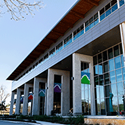Fully online learning: Another option to completion
July 30, 2019
In the traditional college learning experience, a student attends school full-time, dedicates all his or her time and energy to academics, and completes a degree in a few short years. This, however, is not the only path to completing a degree. There are many non-traditional avenues for students seeking degrees and certificates, including fully online options. A recent study from NPR states that close to 74 percent of undergrads fall into the category of "non-traditional student." Of these students, 1 in 5 are at least 30 years old, and 47 percent go to school part-time. Across the five Alamo Colleges, over 80% of students are part-time.
| Non-traditional students are the new norm, and the narrative of education continues to expand, with many of these returning students choosing online learning. |
One reason to pursue online learning is flexibility. Although each class contains specific deadlines and assignments, you control when and where those assignments are completed. Whereas remote learning requires you to be online at certain times, fully online degree or certificate programs let you complete your assignments on your own time. For example, you can work on assignments during your morning bus commute or afternoon lunch hour, thus giving you the time to care for your child or parents in the evening.
For students like Felicia Campos, an online student at St. Philip's College, the flexibility of fully online options extends beyond personal obligations. It allows them to work as a professional while completing their degree. It can be challenging to balance working part or full time with a course load, but online courses and degree programs allow students the option to complete required coursework when it's most convenient – early mornings before the kids wake up or late nights after a long shift.

More importantly, students who work while completing degrees can integrate various academic skills into their professional roles. Skills like critical thinking, oral communication, and resilience are required to succeed in an online capacity, and these are highly touted skills in the working world. For example, as you successfully complete your online courses, you are demonstrating to your current or potential employers that you are competent and willing to work hard, both of which are highly valued in the business. Some students may even decide to continue their coursework following degree completion, thereby benefiting employers with more knowledge and skill.
Choosing a fully online degree is a valuable option that offers tremendous personal and professional benefits. In addition, many professional industries are shifting due to the COVID pandemic, allowing remote work and telehealth, making the flexibility of online learning an even more viable option for those seeking career advancement and higher education. With five Colleges offering numerous degrees and certificates fully online, you are sure to find a fit for your interest and career needs at the Alamo Colleges.
For more information
Contact an Enrollment Coach, today!Enrollment Coaches are here to help you get started with the application process and to guide you through registration for fully online courses this upcoming semester. We can also connect you to an advisor, as well as refer you to services available to online students. Don't delay, call (210) 485-0110 or email AlamoONLINE@alamo.edu, today!Frequently Asked Questions |
About AlamoONLINEAlamoONLINE represents the range of opportunities for students pursuing degrees, certificates, or other offerings delivered 100% online from Northeast Lakeview College, Northwest Vista College, Palo Alto College, San Antonio College, and St. Philip’s College. At our Alamo Colleges, a 100% online degree, certificate, other offering, or Transfer Advising Guide (TAG) has all courses offered fully online and does not require students to come on campus or to an external site except for required proctored exams or to participate in a clinical, internship, cooperative education, or practicum site. |







